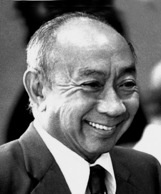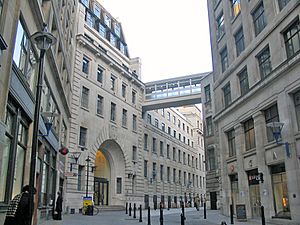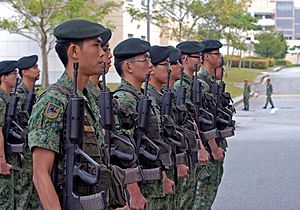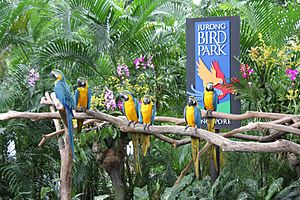Goh Keng Swee facts for kids
Quick facts for kids
Goh Keng Swee
DUT
|
|
|---|---|
|
吴庆瑞
|
|
 |
|
| Deputy Prime Minister of Singapore | |
| In office 20 March 1973 – 1 January 1985 Serving with S. Rajaratnam (1980–1985)
|
|
| Prime Minister | Lee Kuan Yew |
| Preceded by | Toh Chin Chye |
| Succeeded by | Goh Chok Tong Ong Teng Cheong |
| Chairman of the Monetary Authority of Singapore | |
| In office August 1980 – December 1997 |
|
| Prime Minister | Lee Kuan Yew |
| Preceded by | Hon Sui Sen |
| Succeeded by | Richard Hu |
| Minister for Education | |
| In office 12 February 1979 – 2 January 1985 |
|
| Prime Minister | Lee Kuan Yew |
| Preceded by | Chua Sian Chin |
| Succeeded by | Tony Tan |
| Minister for Defence | |
| In office 11 August 1970 – 11 February 1979 |
|
| Prime Minister | Lee Kuan Yew |
| Preceded by | Lim Kim San (as Minister for Interior and Defence) |
| Succeeded by | Howe Yoon Chong |
| Minister for Finance | |
| In office 17 August 1967 – 10 August 1970 |
|
| Prime Minister | Lee Kuan Yew |
| Preceded by | Lim Kim San |
| Succeeded by | Hon Sui Sen |
| In office 5 June 1959 – 8 August 1965 |
|
| Prime Minister | Lee Kuan Yew |
| Preceded by | Office established |
| Succeeded by | Lim Kim San |
| Minister for Interior and Defence | |
| In office 9 August 1965 – 16 August 1967 |
|
| Prime Minister | Lee Kuan Yew |
| Preceded by | Office established |
| Succeeded by | Lim Kim San |
| Member of the Malaysian Parliament for Singapore |
|
| In office 2 November 1963 – 9 August 1965 |
|
| Preceded by | Position established |
| Succeeded by | Position abolished |
| Member of the Singapore Parliament for Kreta Ayer |
|
| In office 30 May 1959 – 4 December 1984 |
|
| Preceded by | Constituency established |
| Succeeded by | Richard Hu (PAP) |
| Personal details | |
| Born |
Robert Goh Keng Swee
6 October 1918 Malacca, Straits Settlements, British Malaya (now Malaysia) |
| Died | 14 May 2010 (aged 91) Singapore |
| Cause of death | Bladder cancer |
| Nationality | Singaporean |
| Political party | People's Action Party |
| Spouses | Alice Woon (m. 1942 div. 1986) Phua Swee Liang (m. 1991) |
| Children | Goh Kian Chee (son) |
| Alma mater | London School of Economics (BS, PhD) |
| Signature |  |
| Military service | |
| Branch/service | Singapore Army |
| Years of service | 1939–1942 |
| Rank | Honorary Colonel |
| Unit | 20th People's Defence Force |
| Goh Keng Swee | |||||||||||
|---|---|---|---|---|---|---|---|---|---|---|---|
| Traditional Chinese | 吳慶瑞 | ||||||||||
| Simplified Chinese | 吴庆瑞 | ||||||||||
|
|||||||||||
Goh Keng Swee (Chinese: 吴庆瑞; pinyin: Wú Qìngruì; 6 October 1918 – 14 May 2010) was a very important Singaporean leader. He was the Deputy Prime Minister of Singapore from 1973 to 1985. Many people see him as one of the "founding fathers" of modern Singapore. He also helped start the People's Action Party (PAP), which has led the country since it became independent.
Goh was a key person in Singapore's first group of leaders after it gained independence in 1965. He served as Minister for Finance twice (1959–1965 and 1967–1970). He was also Minister for Interior and Defence (1965–1967), Minister for Defence (1970–1979), and Minister for Education (1979–1985).
As Minister for Interior and Defence, Goh worked to make Singapore's military and security stronger. This was important after the British army left, making the new country vulnerable. A major step was creating National Service (NS). This system requires young, able-bodied men to serve in the military.
When he was Minister for Finance, Goh decided that Singapore's central bank should not print money freely. Instead, he preferred a "currency board" system. This showed that the government would not just spend money without earning it. The Monetary Authority of Singapore (MAS) was later set up in 1971.
In 1981, Goh also suggested creating the Government of Singapore Investment Corporation (GIC). This fund would invest Singapore's extra money. At that time, it was unusual for a country without a lot of natural resources to have such a fund.
Contents
Early Life and Education
Goh Keng Swee was born in Malacca on 6 October 1918. His family was Peranakan, and he was the fifth of six children. His father managed a rubber plantation. When Goh was two, his family moved to Singapore.

Goh went to the Anglo-Chinese School from 1927 to 1936. He then studied at Raffles College (now the National University of Singapore), graduating in 1939 with a focus on economics.
After college, Goh worked as a tax collector. During World War II, he joined the Singapore Volunteer Corps. After the war, he worked for the Department of Social Welfare.
Goh received a scholarship to study at the London School of Economics (LSE). In London, he met other students who wanted their home countries to be independent from British rule. These included future leaders like Lee Kuan Yew. They formed a discussion group called the Malayan Forum in 1948, with Goh as its first chairman. He graduated from LSE in 1951 with top honours in economics.
In 1954, Goh returned to LSE for his PhD in economics, finishing in 1956. He then worked in the civil service, leading the Social and Economic Research Division. In 1958, he left the civil service to work full-time for the People's Action Party (PAP).
Political Journey
Before Singapore's Independence
Goh was a key member of the PAP's leadership committee. He won the election in Kreta Ayer in 1959. On 30 May 1959, he became the first Minister for Finance under Prime Minister Lee Kuan Yew.
As Finance Minister, Goh managed Singapore's economy. He made sure the government spent money wisely. He helped set up the Economic Development Board (EDB) in 1961. The EDB's goal was to attract foreign companies to invest in Singapore.
The next year, he started developing the Jurong industrial estate. This area, once a swamp, became a major industrial hub. Goh believed that "the only way to avoid making mistakes is not to do anything. And that... will be the ultimate mistake."

In the 1960s, there were challenges from groups who supported communism. Goh and Lee Kuan Yew believed that merging with Malaya to form Malaysia was important for Singapore's economy and stability. In 1961, some members left the PAP to form the Barisan Sosialis.
Joining and Leaving Malaysia
Singapore joined Malaya and other British territories in 1963 to form Malaysia. However, this merger faced problems. There were disagreements on political and economic issues. Goh played a key role in protecting Singapore's interests.
After two difficult years, Goh decided it would be better for Singapore to separate from Malaysia. This led to Singapore becoming an independent nation on 9 August 1965.
After Singapore's Independence
Building Singapore's Defences (1965–1967)
After independence, Goh became Minister for Interior and Defence. He was in charge of making Singapore's military and security stronger. He started National Service, which requires young men to serve in the armed forces.
Managing Singapore's Money (1967–1970)
Goh served as Minister for Finance again. During this time, he continued to support a "currency board" system. This meant that the government could not simply print more money. This helped show the world that Singapore's economy was stable.
Leading the Ministry of Defence (1970–1979)
On 11 August 1970, he was reappointed Minister for Defence.
Deputy Prime Minister and Education Reformer (1973–1984)
On 1 March 1973, Goh was appointed Deputy Prime Minister.
In 1979, Goh became Minister for Education. His "Goh Report" greatly shaped Singapore's education system. He helped transform the system over 30 years. He set up the Curriculum Development Institute. He also introduced "streaming" in 1980. This system guides students into different study paths based on their learning abilities. Goh served two terms as Education Minister before retiring in 1985.
From 1980, he was called the First Deputy Prime Minister. He also served as Chairman of the Monetary Authority of Singapore. He stepped down from Parliament on 3 December 1984. Prime Minister Lee Kuan Yew praised him, saying Goh had "laid the foundations of the economy of modern Singapore."
Other Important Contributions
Government of Singapore Investment Corporation (GIC)
In 1981, Goh suggested creating the Government of Singapore Investment Corporation (GIC). This fund invests Singapore's extra money to help it grow. At the time, it was a new idea for a country like Singapore to have such a fund.
Defence Science Organisation (DSO)
In 1971, Goh started a special team of engineers to develop Singapore's defence technology. This secret project was called Project Magpie. In 1977, the group was renamed the Defence Science Organisation (DSO). Today, it is known as DSO National Laboratories.
Culture, Sports, and Fun Places
Goh also supported projects to improve Singaporeans' lives and provide fun activities. These include the Jurong Bird Park, Singapore Zoo, and the Singapore Symphony Orchestra.
He supported building the Kreta Ayer People's Theatre for Chinese opera. He also encouraged the creation of the Institute of Southeast Asian Studies in 1968.
Goh helped introduce rugby to the Singapore Armed Forces and later to schools. A schools' rugby cup is named after him. He also helped bring Underwater World to Singapore, which opened in 1991.
Later Life and Passing
After retiring from politics, Goh continued to be active in public life. He served as Deputy Chairman of GIC and the Monetary Authority of Singapore. He also advised the Chinese government on economic development and tourism.
Goh passed away on 14 May 2010, at the age of 91. His body was displayed at Parliament House for people to pay their respects. A state funeral was held on 23 May 2010. As a sign of respect, State flags were flown at half-mast at all government buildings.
Awards and Recognition
Goh received many honours for his contributions. In 1972, he received the Ramon Magsaysay Award, often called "Asia's Nobel Prize." This award recognises integrity in government and service to the people. That same year, the Philippine Government gave him the Order of Sikatuna for strengthening relations between countries.
In 1985, after his retirement, Goh was awarded the Order of Temasek (First Class). This is Singapore's highest civilian honour.
In 2010, Prime Minister Lee Hsien Loong announced that two places would be named after Goh Keng Swee. These are the Goh Keng Swee Command and Staff College for military officers and the Goh Keng Swee Centre for Education for teacher training.



